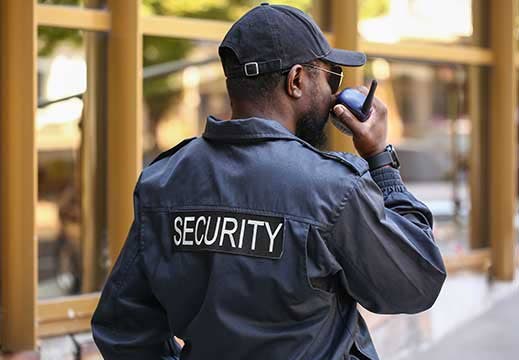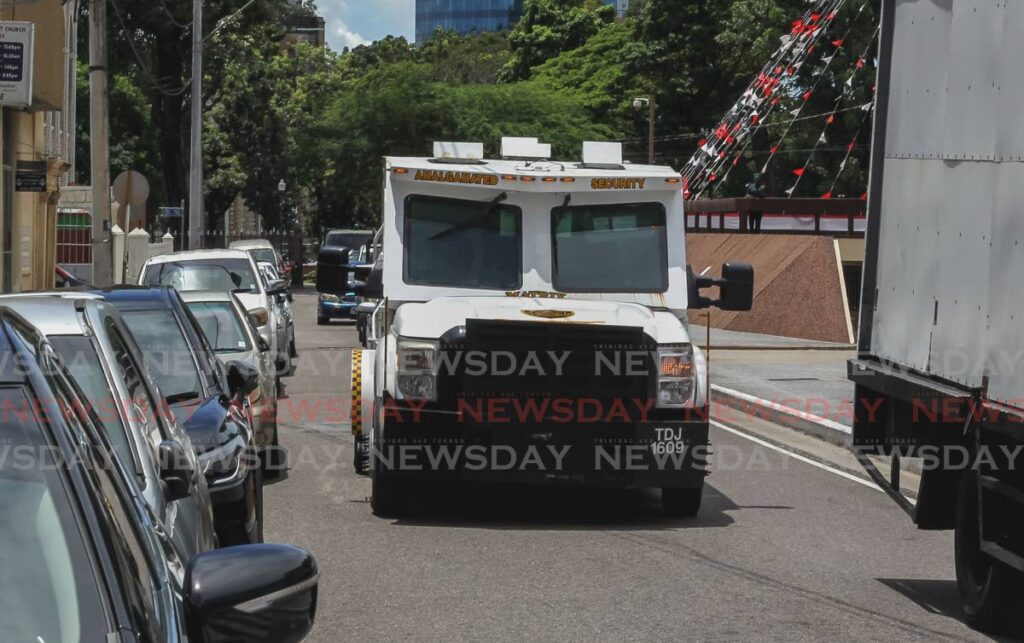Guards out-gunned

While criminals in TT evolve, gaining access to high-powered weapons, and learning new tactics to commit acts of violence, several security stakeholders claim that their industry has not progressed.
With a lack of equipment – some even having to share bullet-proof vests – training and support, security officers and estate police tasked with protecting businesses have begun to struggle against the criminal elements.
Now, the Estate Police Association is calling for more investment in security to not only better protect the lives of clients, customers and employees, but also the security officers.
Deryck Richardson, president of the estate police association, said because of the lack of support for security officers, many are not invested in protecting the people and property they have been sworn to protect.

-
“You can’t be asking the people in this period of high crime to go out there without proper training and proper equipment and not be compensated properly. So you’ll have a situation where people are not invested because they’re fearful for their life.”
Estate police constables have similar powers as police with the right to arrest, and use force, lethal if necessary. These officers are armed and are usually the first line of defence when clients are faced with armed criminals. Estate constables have to satisfy requirements by the Commissioner of Police, through an exam called a precept, in accordance with the Supplemental Police Act. Firearm training is a major part of the requirements to be an estate constable, but the extent of that training is dependent on the company he/she works for.
Ken Williams, CEO of Ken Williams Tactical Training Academy, said in most cases the training is basic, and not necessarily adequate for the situations an armed guard would face while executing his duties.
“We saw a shortcoming in the industry where security officers are not properly trained, but instead they do a one-week programme or a one-day programme and companies give these individuals firearms to carry every day,” Williams said.
While unarmed guards do not have the powers of arrest as a police officer or an estate constable, they have the ability to execute a citizens’ arrest, in which they can detain a person – through physical force if necessary.
But these guards are not properly trained either.
Estate police constable Stephen Pantin told Business Day for unarmed security officers the training is rudimentary.
“For security companies everything comes at a cost,” he said. “The company has to pay for levels of training, hand-to-hand combat training and so on. A lot of security companies try to get away from that, so they try to do everything in-house with whomever they have that may be qualified or sometimes not even qualified, just experienced enough to pass on knowledge. Then they send them out.”
Richardson said since 2019, the association has been pleading with government to remove taxes on important protective equipment such as bullet-proof vests. He said as a capital investment companies would have to fork out big bucks to equip their officers with the proper vests. One vest costs about $5,000 and up, depending on the grade and quality of the vest.

Level II A body armour protects against small arms which fire 9 mm rounds and 40-calibre rounds. Level II body armour protects against all handgun ammunition including .357 ammo. Level III A body armour shields against high speed handgun rounds travelling in excess of 1,400 feet per second. Certified level III A+ protects the body from shotgun rounds. A level III vest can protect against high-speed handgun rounds and .44 magnum rounds. Level IV body armour can take a hit from a 7.62 mm armour piercing rifle travelling at 2,880 feet per second. But employers, Richardson said, tend to cut costs with the quality and longevity of the vests security officers use.
“What you find is people sometimes have to share vests. That is supposed to be PPE,” he said. “Then you would find some employers buying substandard vests. A vest lasts between three and five years, and we have found on many occasions that vests are used in excess of seven and ten years. We had to stop one company from sending their officers out because their vests were 10 and 12 years old. When we tested them, they were totally inefficient against the simplest 9 mm round.”
Richardson added that compensation for death or injury is seldom provided outside of the Workman’s Compensation Act, which excludes armed security guards. He said armed and unarmed security guards have to depend on personal insurance policies in the event of death or injury. He complained that not even overtime is provided for in the same way as a regular employee.
In a 2016 Industrial Court case between the association and G4 Security, then chairman of the essential services division, L Achong, came to the conclusion that paying armed guards overtime after eight hours rather than a 12-hour shift would result in an increase in costs for security companies that they would not be able to absorb.
“The salary cost to companies will be immediately increased by 16.6 per cent. This will either be 1) absorbed by the companies; or 2) passed on to clients if possible, since fixed rates contracts will already be in place and binding. In the case of 1) many of the small and medium-sized companies may not be able to absorb those increased costs for any protracted period of time and, therefore, closure is inevitable. With regard to 2) the security industry as a whole would experience a contraction as a result of a shrinking client base since clients will be unwilling to pay higher costs for manned security services, opting instead for electronic security systems,” Achong said in his judgment.
The result is losses to all involved – businesses lose revenue at the hands of criminals, and security officers who protect the businesses lose their lives.
Last September, three security officers were shot by bandits who ambushed them while driving out of the Pennywise Super Centre in La Romaine. Security guards Jeffrey Peters, 51, and Jerry Stuart, 49, died as a result of their injuries.
Security guards out-gunned
Richardson said normally security companies would use level III body armour which would protect against small arms. However, in robberies such as the La Romaine incident, bandits have access to high-level performing weapons which would be too much for the standard vest.
In the La Romaine case, police said three AR-15 rifles were found after an exchange of gunfire with police left four bandits dead. AR-15 rifles use 5.56 mm and 7.62 mm ammunition which can rip apart the standard vest used by security firms.
“We have stated in different forums that the threat level in this country has risen because of the type of firearms and the access to ammunition that criminals have,” Richardson said.
The TTPS confirmed that up to December 30, it seized 675 firearms. In October, the TTPS confirmed that it had seized 76 high-powered rifles.
Williams said new tactics are being used by bandits, mostly from what is seen on TV. Using higher numbers, more powerful weapons and gathering information are all strategies that have resulted in more dangerous criminals.
“There is a trend with bandits now where they would pass by a place and observe an area,” he said. “Then they are coming back. This means that they are casing an area and targeting people.”
“Bandits are also not coming in ones and twos anymore. They are coming in fours and fives.”
Pantin added unmanned security measures such as security cameras while an effective deterrent does not stop criminals. He also said because of new norms coming out of the covid19 pandemic, cameras are less effective.
“Cameras just record what takes place so police could have evidence after the fact,” he said. “It does absolutely nothing to stop a criminal from coming into your home or business. Actually many of these criminals know the cameras are there so they put on a mask.”
“The pandemic has also empowered the criminals somewhat because now, wearing a mask on your face is not out of place,” he added. “Before when you see masked people walk into your place you would think twice and be aware. Now it is commonplace to see guys wearing masks, bandannas and other face coverings. So people walk in masked, and before you know it there is an armed robbery going on.”
Situational awareness the best defence
Despite the new tactics and access to more dangerous weapons, the best defence against criminals for citizens, business owners and security personnel alike is still being aware of the surroundings and being prepared for danger.
Williams’ training courses focus heavily on situational awareness, he said, adding that being observant and aware of the people around you could save your life.
“Most is mindset training – how you observe your surroundings, what to look for, if anybody looks suspicious,” he said. “You can look at their body posture to see if anything is poking out their waist. You could look at their body language to see if they are nervous; because when somebody comes to rob you they are a little more nervous than you.”
He said his training courses teach security guards how to analyse a situation and get out of it with their lives intact.
He also advised that business owners with firearm user’s licences (FUL) should find the time to practice using their firearm and keep it in a close but secure place, because when criminals strike it may be one’s only defence.
“The last commissioner of police had a vision which was for business owners to have an equal opportunity through the state to defend themselves. But owners are not using that to their best advantage, meaning that they are not properly trained.”
He said several FUL holders are now clients, and he has observed that some do not know the basics of firearm use, including the parts of a gun.
“What I tell my clients is this – as an FUL holder you need to come to the range at least once or twice a month,” he said. “Buy a box of ammo, get with an instructor, and let them teach you the proper way to use this tool – the proper way to carry it; how to dress, which is a key part where you have to wear a jacket or take into consideration whether you wear tight clothes.”
“You need to know how to protect your family, because most of the time, when these things happen, you are either with your staff or with your family. So protecting your family is what we teach.”
As of January 1, the fees for all FULs increased by 100 per cent, as announced by the Finance Minister in the 2022/2023 budget last September. Assault weapons have higher fees with private citizens paying $5,000 a year, and $1,000 for use on a firing range. Government, however, plans to restrict private ownership of assault weapons through pending amendments to the Firearms Act.


Comments
"Guards out-gunned"